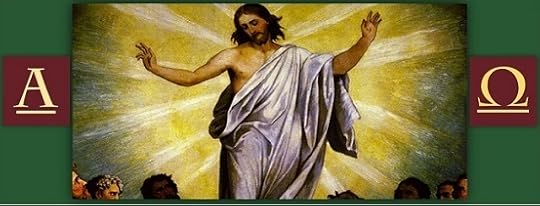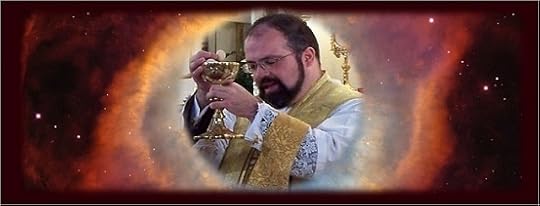Carl E. Olson's Blog, page 91
June 19, 2014
Believing in the Justice of the Cross: Jesus Christ as the Alpha and Omega of Faith
by Fr. Lorenzo Rossetti | Homiletic & Pastoral Review
Adhering with love to the Lord, Victim and Priest, Obedient and Merciful, we embrace him in the real and veiled presence of the broken Bread, and we celebrate the victory against evil, sin, and death.
This essay focuses on the Christological and “Staurological” (from stauros, “cross” in Greek) dimension of our Christian faith, proposing a unique synthesis of biblical thought including Pope Francis’ Lumen Fidei teaching. It stresses the role of the Paschal Christ as archêgos (starting point), as well as teleiotês (consummator) of faith according to Hebrews 12:2—the Alpha and the Omega of Revelation 1:8; 22:13. This path of faith begins with the salvific proposal of the cross as divine love towards human beings (exitus a Deo), and culminates in the personal sharing of the holy justice of Christ’s cross as our sharing in his love for the Father (reditus in Deum). Finally, we shall conclude by linking our faith, our charitable actions, and our prayerful worship as the way of holiness (iter fidei) for all Christians.
Accordingly, I propose here a reflection in light of a short passage from the so-called Letter to the Hebrews. 1 It will not be scientific hermeneutics; it will rather be a theological meditation which will allow us to grasp a unique synthesis of the Pauline, and, generally, neo-testamentary, thought on faith. I believe this is actually the task I was assigned. I will try, as much as possible, to integrate the pontifical teaching of Pope Francis’s Lumen Fidei (June 29th, 2013; hereafter, LF).
Let us begin by recalling Hebrews 12:1-3, a very rich passage exhorting us to keep running, with our eyes fixed firmly on Faith, through his very own witnesses:
With so many witnesses in a great cloud all around us, we too, then, should throw off everything that weighs us down and the sin that clings so closely, and with perseverance keep running in the race which lies ahead of us.
Let us keep our eyes fixed on Jesus, who leads us in (gives rise to) (archegon) faith and brings it to perfection (teleioten). For the sake of the joy (charas) which lay ahead of him, he endured the cross (stauron), disregarding the shame of it (aischynes),and has taken his seat at the right of God’s throne (thronou).
Think that he persevered against such opposition (antilogian) from sinners and then you will not lose heart and come to grief.
In this fragment, the author urges patience (hypomone), which is the most excellent virtue of the Christians; the one which will receive the crown, as St. Augustine 2 said. In support of Christian patience, there is the memory and the fellowship of the saints; seeing ourselves surrounded by so many people who have lived the experience of faith, and have brought it to completion. 3 There is no loneliness in living the faith: we are helped and supported by the witness of others. Yet, perseverance means not succumbing to difficulties, and not giving into tribulations. We must, first of all, look at Christ, whose steadiness is exalted in spite of shame (aischyne) and hostility (antilogia). But the backbone of this exhortation is that this Jesus, 4 who was humiliated and opposed, is actually the one who has been glorified (thronos).
What is faith?
And the largest cult in China today is....
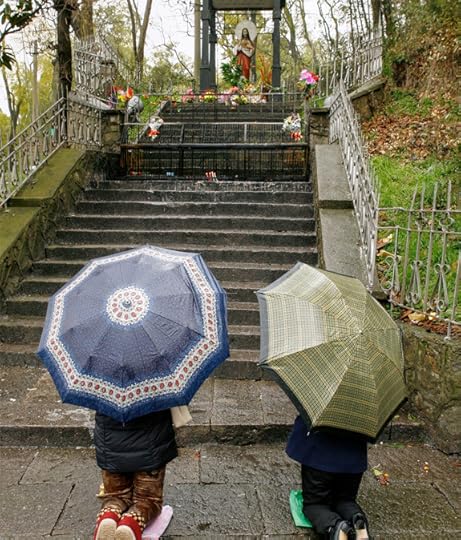
Women pray near the Sacred Heart of Jesus statue at the shrine dedicated to Our Lady of Sheshan outside Shanghai in 2007. (CNS photo/Nancy Wiechec)
by Carl E. Olson | CWR blog
Murong Xuecun, a Chinese novelist, writes of recent measures taken by the Chinese government to intimidate Christians and repress the growth of Christianity:
On June 1, my friend Pastor Wang Yi of the Early Rain Reformed Church in Chengdu was arrested while distributing anti-forced-abortion leaflets. The stated grounds for detaining him were “illegal advertising.” He was let go after half an hour. Three days later, Mr. Wang was detained again. This time the arresting officers produced no identification and gave no reason for taking him in. After 12 hours of interrogation, he was finally released at midnight.
Xuecun notes when he posted about the arrest, several readers protested the injustice—but many supported the government's actions, with one stating, “The cops have done a beautiful job!” He points out that some of the hostile reactions may come from those being paid to mouth the Party line: "The government employs a cyberpolice force of propagandists known as the 50-Cent Party. But given other recent events, and China's agonizing history with organized religion, I believe that a good number of the pro-government comments reflected genuine opinion."
Xuecun reports that the government recently released a list of twenty active "cults", instigating an anti-cult campaign that has led to more overt attacks on mainstream religions such Christianity, with talk of how Christians undermine "national security." He writes:
The government’s anti-religion campaign is not borne of concern for public security stemming from a horrific murder. This is a concerted effort to bring independent churches and their followers into line. The clampdown is simply the government’s way of strengthening its control of society.
As the government has cracked down on Christian groups and churches, it has pinpointed not only the legal churches, but also the "underground" or "home" churches, culminating (so far) in the demolishing of the new Sanjiang Church—"the crown jewel of the city of Wenzhou." Afterward, the pastor of that Protestant church reportedly said, "Pray for the Christians in China. The Communist Party sometimes begins with a small act, like tearing down one church, and it becomes a trend that could spread throughout China.”
Xuecun concludes with this fascinating observation:
June 18, 2014
“Nuclear fission in the…heart of being”
The Eucharist as the Sacrament of Transformations in the Teaching of Pope Emeritus Benedict XVI | Father Donncha Ó hAodha | HPR
Pope Emeritus Benedict XVI’s use of the image of nuclear fission—…in a positive sense, in order to explain the Eucharistic mystery—is contemporary and striking, and apt to convey the quiet, but immense, power of the Mass.
The Sacrament of Transformations
Recent history has made us all too aware of the overwhelming effects of nuclear fission. The enormous power it can have on nature is inversely proportional to the diminutive particles in which the initial process occurs. What is discreet and hidden, what defies normal sensory perception, turns out to have awesome consequences for good or ill. Nowhere is this paradox more dramatically evident than in the case of the atomic bomb. One survivor of the Nagasaki blast said it was like the sun bursting. A transformation within a tiny particle of matter unleashed a series of massive transformations—of the atmosphere and the landscape, of history and of human lives—that we are still grappling with today.
Pope Emeritus Benedict XVI’s use of the image of nuclear fission—but in a positive sense, in order to explain the Eucharistic mystery—is contemporary and striking, and apt to convey the quiet, but immense, power of the Mass. As Christ taught it, his self-offering is “like inducing nuclear fission in the very heart of being—the victory of love over hatred, the victory of love over death. Only this intimate explosion of good conquering evil can then trigger off the series of transformations that little by little will change the world.” 1
Benedict XVI’s papal teaching was eminently Eucharistic. His words on this sacrament, in numerous homilies and discourses, and especially in the post-synodal apostolic exhortation Sacramentum Caritatis 2, invite constant meditation. But perhaps this Holy Father’s most profound teaching on the Eucharist was not, in fact, expressed in words. Periods of silent prayer before the monstrance during solemn exposition became a hallmark of his pontificate. One thinks, for example, of the throng at Hyde Park at the prayer vigil on the eve of the Beatification of John Henry Newman being in hushed adoration within the throbbing metropolis of London; or of the storm-drenched multitude of young people kneeling at the Eucharistic Vigil at World Youth Day in Madrid in August 2011.
Such adoration is, in itself, a powerful catechesis.
"Toward the Gleam": Making the Sausage
by T.M. Doran | IPNovels.com
I’ve been asked by many how this story came to be. Where did the idea originate? How was the “superstructure” of the story assembled? How long did it take to compose Toward the Gleam?
These questions are asked of many authors about many novels. Some story writing happens so organically that only in retrospect can the experience be described, because it is far more than just work products and dates.
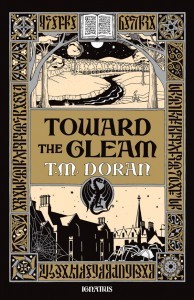 Some aren’t interested in how the sausage is made, or would rather not know, but for those intrigued by such things, here is the backstory—to the best of my recollection. The short answer I’ve given in interviews and in response to readers’ questions: Toward the Gleam took 20-30 years to compose. In fact, research began long before the idea for the story was conceived, in the sense that the story feeds on paleohistory, the ideologies and emerging science of the 20th century, and 20th century historical characters. Going back to the 1970s, I had a keen interest in these subjects and sought books and articles on philosophical, historical (including paleohistorical), and scientific topics, as well as biographies of remarkable men and women. Some of these works, such as Peter Kreeft’s The Philosophy of Tolkien combined biography and an intense exploration of ideas. Others, such as Martin Gilbert’s biography of Churchill, provided deep insight into their subject. The documentary and literary works of these historical characters themselves, such as Churchill’s A History of the English Speaking Peoples, Chestertons’s The Everlasting Man and Fr. Brown stories, allowed me to hear their ideas and beliefs, along with stylistic nuances, in their own literary voices. Even though only snippets were incorporated into Toward the Gleam, the insight and detail these resources provided made me comfortable—If such a word can be used—transplanting some of the “DNA” of these historical characters into my own characters.
Some aren’t interested in how the sausage is made, or would rather not know, but for those intrigued by such things, here is the backstory—to the best of my recollection. The short answer I’ve given in interviews and in response to readers’ questions: Toward the Gleam took 20-30 years to compose. In fact, research began long before the idea for the story was conceived, in the sense that the story feeds on paleohistory, the ideologies and emerging science of the 20th century, and 20th century historical characters. Going back to the 1970s, I had a keen interest in these subjects and sought books and articles on philosophical, historical (including paleohistorical), and scientific topics, as well as biographies of remarkable men and women. Some of these works, such as Peter Kreeft’s The Philosophy of Tolkien combined biography and an intense exploration of ideas. Others, such as Martin Gilbert’s biography of Churchill, provided deep insight into their subject. The documentary and literary works of these historical characters themselves, such as Churchill’s A History of the English Speaking Peoples, Chestertons’s The Everlasting Man and Fr. Brown stories, allowed me to hear their ideas and beliefs, along with stylistic nuances, in their own literary voices. Even though only snippets were incorporated into Toward the Gleam, the insight and detail these resources provided made me comfortable—If such a word can be used—transplanting some of the “DNA” of these historical characters into my own characters.
In the case of the philosophical questions, I frequently referred to my 4-volume Encyclopedia of Philosophy (not to be tackled after a glass of wine), and to the encyclicals and letters of St. John Paul II. A keen interest in the compatibility and intersection of science and philosophy drew me to Kurt Gödel, Einstein, and Ludwig Wittgenstein. Intellectual struggles abounded; for example, trying to wrap my mind around phenomenology, Gödel’s incompleteness theorem, and Owen Barfield’s concepts of consciousness.
First names and aliases were adopted for the veiled historical characters, not for legal reasons as some have surmised, but to keep some “space” between the historical characters and my own literary characters, to allow me to take these characters places—geographically, behaviorally, psychologically—that differ from the actual historical characters. A prominent example of this “space” is the Stockholm chapter featuring John Hill and Greta Erickson.
I have been reading—and enjoying—mystery stories for decades, and it made sense to re-examine A. C. Doyle, Agatha Christie, and J. D. Carr in regard to the mystery and suspense elements of the story. I love a good mystery and have tried my hand at dozens of short stories (for those interested, you can find “The Deadly Dart Mystery” in an appendix to Terrapin, and “A Legendary Mystery” and “The Yellow Tavern Mystery” on the Ignatius Press site). T” contains two such puzzle plots: the mystery of Sir Richard Hope’s disappearance that Gilbert solves in the September 14, 1931 chapter (a la Fr. Brown), and the puzzle of the vanishing treasures.
I don’t remember the exact day or year of the “Aha” moment, when the foundational idea for the story came to me, but it was around the year 2000, while I was taking a walk. Although I was invigorated by the idea, I was also intimidated by the effort and research that would be necessary to pull off such an audacious concept.
June 16, 2014
Sheila Liaugminas discusses "Non-Negotiable: Essential Principles of a Just Society and Humane Culture"...
... with Catholic New World (Archdiocese of Chicago) and CatholicMom.com.
First, from the interview with Catholic New World:
CNW:What are the non-negotiables?
Liaugminas: Catholic social teaching covers a broad spectrum of principles we must not capitulate on or abrogate in caring for human life and needs. It’s not negotiable that we must feed the hungry, shelter the homeless, relieve suffering, protect the vulnerable, seek justice wherever it is denied, work for peace.
But some rights are so fundamental to all others that they take pre-eminence as first principles for a free, just and virtuous society to exist and flourish. They are life from the biological beginning to life at the most dependent final end, marriage between one man and one woman for the sake of their children and the role of family in society, and the protection of conscience and religious freedom to carry out the social gospel in public life.
CNW: You write that the right to life underlies all of the non-negotiables. Some critics say the Catholic Church focuses too much on abortion over other issues. How do we respond to that?
Liaugminas: If you can’t guarantee the right to life, no coherent argument can be made for any other right for human beings. Our popes, each in succession, have taught this immutable truth repeatedly and forcefully. We should never be defensive of such a fundamental truth. It’s not an “either/or” proposition of abortion or other important human rights. It’s a “both/and,” beginning with protecting human life from the youngest, most vulnerable stage through to human life in the final, often vulnerable stage. Every abortion ends a human life. Full stop. ...
CNW: What’s the value of the Christian witness in today’s world?
Liaugminas: When lived out, ours is a countercultural witness to transcendent truths about human dignity inherent to every person, deriving not from a State or government but from the Creator. Christians throughout the ages have witnessed to those eternal truths in the face of grave dangers, and we are the modern inheritors of that tradition and the teaching of the church. G. K. Chesterton said there are many ways to fall, but only one way to stand. It is with the truth found in the Christian faith. Rev. Dr. Martin Luther King Jr. said “The end of life is not to achieve pleasure or avoid pain. The end of life is to do the will of God, come what may.” These are timeless truths and we have to be courageous, unafraid, calm and charitable in debating, defending or sharing them with people in the modern world.
Our recent popes have given us the moral grammar to talk about these issues with clarity and charity in a society that has given rise to “the culture of death” as Pope John Paul II stated it, an increasingly secular society that is “increasingly growing hostile to Christianity,” as Pope Benedict XVI stated it, a “throwaway culture” that has grown into a “culture of indifference” as Pope Francis stated it.
He calls us continually to “go out to the existential peripheries” and “create a culture of encounter.” That can be across the world in developing countries, or across the street, the office space or even your kitchen table at home in this country. Complacency is not an option. We have been given the knowledge, the words and the tools, and certainly the continual encouragement, to go out and reach the world with the love and mercy of Christ.
I end the book on what I pray is a hopeful note. Early in his papacy, in one of his compelling daily homilies, Pope Francis said “Christians are called to do the great work of evangelizing to the ends of the world … she goes forth with Jesus…This is the magnanimity that Christians should have … this magnanimity is part of the Christian vocation: always more and more, more and more, more and more, always onwards.”
And from CatholicMom.com:
Q: Please briefly introduce yourself and your family to our readers.
Ever since early childhood, I knew I wanted to be a journalist, making my own newspapers while following daily news reporting in the newspaper and network television. I’m a cradle Catholic raised in an environment imbued with the sense of transcendent truth, and the Social Gospel of caring for ‘the least of these’, which informed everything I did as a professional journalist. While reporting for Time Magazine, I married and had two sons, rededicated myself to the faith for their sake, and committed to family and work, in that order. Raising my sons was a wonderful blessing and loads of fun, with lots of family travel that brought us in touch with other cultures and global realities. My firstborn son discerned a call to the priesthood and was ordained in 2010. He’s studying in Rome for his doctorate, and is scheduled to teach on faculty at Mundelein Seminary in a few years. He’s an amazing priest and scholar. My younger son is a gifted writer with a postgraduate degree, struggling as most writers do to find his place while doing unrelated work that feeds his imagination for future fiction pieces. My husband is a physician who loves his family, travel and the always-trying Chicago sports teams. ...
Q: What prompted you to write this book and what do you hope that readers will take from their experience with Non-Negotiable?
The book started as a response to a long perceived need of such a reference, since the bishops issued ‘Forming Consciences for Faithful Citizenship,’ and yet so many Catholics don’t access it. We need an accessible book in hand that distills Church teaching, provides specific points and links, and helps us to ‘be prepared to give an explanation for what you believe’ (a liturgical reading just before Pentecost). Writing it was finally precipitated by a parish Respect Life group’s need for a resource that states clearly what the Church teaches on the top issues of the day, and why. But early on, I prayerfully discerned that the book needed to cast a wider net and drew from the nation’s founding documents, universal human rights declarations and civil rights struggles as well as Church teaching. My intent was to show that these aren’t truths because the Catholic Church teaches them. The Catholic Church teaches them because they’re true.
Q: You cover some critical issues that are complex yet timely in today’s society. Which portions of the book were most challenging to write?
Given the social, cultural and political climate today, fostered by frequent media distortions, the chapter on marriage was probably a tougher one to navigate. I always seek what I call ‘clarity with charity,’ and there’s not much charity in that debate today. With the focus on human dignity of all persons, and the reason for laws and their social ramifications, I wanted to keenly clarify Church teaching and long standing social policy, while upholding dignity for everyone concerned in the debate, which is all of us at this moment in our history. But then, the chapters on when life begins, the euthanasia movement, and religious liberty dealing with the government mandate that violates conscience rights, all presented their challenges.
More about the book:
Non-Negotiable: Essential Principles of a Just Society and Humane Culture
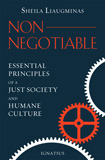
by Sheila Liaugminas
• Also available in Electronic Book Format
What gave Abraham Lincoln the authority to declare the freedom and choice to own slaves as immoral? After all, the law of the land allowed it. What gave Rev. Dr. Martin Luther King the authority to lead a whole movement calling civil laws immoral and demanding new civil rights laws that recognized the equal dignity and worth of "all God's children" without exception? After all, segregation was legal. What gave the United Nations the moral authority to claim and designate absolute human rights in an international declaration, though some member nations were already violating them?
Principles. First principles. In their founding documents, the United States and the United Nations recognized the principles that all men have inherent dignity and that they deserve equal rights. They both have declared those principles the conditions fundamental to freedom, justice, and peace. Yet both the United States and the United Nations have within them powerful political forces passing laws or resolutions that violate first principles and put at risk the most vulnerable populations.
This book goes beyond the politics of pragmatism and cultural relativism to reacquaint the reader with first principles. It demonstrates what the Church has to say about the most important issues of our time and why. It anticipates the questions readers will ask and provides the answers they will need in the struggle to restore respect for human dignity.
Sheila Liaugminas is an Emmy Award-winning Chicago-based journalist in print and broadcast media. She reported for Time magazine in its Midwest Bureau for over 20 years, and co-hosted the Chicago television program YOU. She has appeared on Fox Chicago News and the BBC. Liaugminas is an established contributor to MercatorNet.com, and has been published in the Chicago Tribune, Crain's Chicago Business, Crisis, National Catholic Register, and National Review Online. She currently hosts the daily radio program A Closer Look on Relevant Radio.
Praise for Non-Negotiable:
"Sheila Liaugminas is an articulate voice of the New Evangelization and as she demonstrates in this powerful book, being seriously Catholic today means being part of a culture-reforming counterculture."
- George Weigel, Author, Evangelical Catholicism
"Combining the passion of personal conscience and the convictions of reason and faith, Sheila Liaugminas analyzes conflicted points in our culture in the light of first principles. It's a good tool in skilled hands."
- Francis Cardinal George, O.M.I. Archbishop of Chicago
"Sheila Liaugminas stresses in her fine book that 'Complacency is not an option,' and she hammers home that point with brilliant insight into the past, present and future of all the so-called 'social issues' that continue to divide America. This book is a must-read for every person of faith who understands that action is needed – now – if we ever hope to build a free, just and humane society."
- Dr. Alveda King, Director of African-American Outreach, Priests for Life
"I truly admire Sheila Liaugminas. She is an outstanding journalist. We have dialogued extensively on her radio program about the rights of conscience and the protection of what we call our 'first principles.' Sheila has laid out in great breadth and depth the need for a revived understanding of the essentials of human dignity and societal organization."
- Jeff Fortenberry, Member of Congress
"Both Pope Benedict XVI and Pope Francis have spoken of the 'dictatorship of relativism' in our world today and its negative impacts not just on our faith, but to the common good of society. Shelia Liaugminas draws upon the universal principle of natural human rights and dignity to address several contemporary moral issues which have suffered as a result of a relativistic mindset. Her book is a valuable resource in the struggle to restore a true, just and virtuous society."
- Most Reverend Thomas Paprocki, Bishop of Springfield, Illinois
"Sheila Liaugminas brings her keen insights on applying timeless truths to important issues of the day. She demonstrates how 'first principles' have made free, just, and humane society possible and explains why these principles must be non-negotiable. As America grapples with issues of freedom and justice today, Sheila's book is a must-read for those who want to understand why it is critical that we do not back down from "human truths" – affirmed by the Catholic Church and others – if we want a society that protects every individual's life and dignity."
- Dan Lipinski, Member of Congress
Book Trailer:
The Ecumenical Laboratory of Ukraine

His Beatitude Lubomyr Cardinal Husar at his residence in Ukraine (Photo: Brett R. McCaw)
The Ecumenical Laboratory of Ukraine | Brett R. McCaw | CWR
A conversation with His Beatitude Lubomyr Cardinal Husar about the Maidan movement and relationships between Catholics and Orthodox
On June 7th, Petro Poroshenko was inaugurated as Ukraine’s first elected president since the ouster of Viktor Yanukovych in late February. As Poroshenko’s presidency will take on the challenges of a country whose interests straddle both East and West, the pivotal role of churches within the Ukraine’s contemporary political developments cannot be overlooked. While culturally Orthodox, contemporary Ukraine is one of Europe’s most ecclesiastically pluralistic countries with the historical presence of Eastern-rite Catholic, Latin-Rite Catholic, Protestant, and smaller Jewish and Muslim communities along with its Orthodox majority, which is represented by three churches: Ukrainian Orthodox Church of the Kyivan Patriarchate (UOC-KP), Ukrainian Orthodox Church (Moscow Patriarchate), and the Ukrainian Autocephalous Orthodox Church.
What St. John Paul II would once refer to as the “Ecumenical Laboratory of Ukraine” during his 2001 Papal visit to the country was very much manifest within the Maidan movement over the past seven months. The ecumenical presence of clergy along with public liturgies and prayers were quintessential to the “Maidan” gatherings on Kyiv’s Independence Square that began in late November of 2013.
Among the most notable religious figures within post-Soviet Ukraine is His Beatitude Lubomyr Cardinal Husar, who led the Ukrainian Greek Catholic Church, the largest Eastern-rite Church in communion with Rome, from 2001 until his retirement in 2011. During his decade of leadership, Cardinal Husar became a unanimously respected moral and ecumenical voice in the country. Nevertheless, his leadership faced significant challenges posed by the legacies of Soviet Communism and the historical enmities between Ukraine’s Catholic and Orthodox faithful.
In this interview with the Catholic World Report, Cardinal Husar offers his characteristically candid, yet wise, insight into the role of the Church in Ukraine’s Maidan movement, the question of ecumenism in Ukraine, and the oftentimes complex relationship between the Catholic and Russian Orthodox Churches.
CWR: Do you feel that the experience of the Maidan movement has created an opportunity for the Ukrainian Greek Catholic Church to show its solidarity for the whole of Ukraine?
His Beatitude Lubomyr: The Church was not an agent, but served. And we made a point of it. We were there to serve the people who had come on their own. We had done nothing consciously to advise people—to “convince” them to go. I addressed the Maidan a couple of times in order to emphasize that the Church supported the Maidan and for what it stood.
At last, the people of Ukraine would live in a truly democratic society. We have always spoken simply—welcoming what has happened simply in the sense of serving and not in the intention of taking lead to become a leader in this entire movement, but to serve people and serve their religious needs.
CWR: During your leadership, you made strong efforts to strengthen ecumenism between your Church (Ukrainian Greek Catholic Church) and Orthodox churches of Ukraine. In particular, how would you assess the relationship of your church with the Russian Orthodox Church—Moscow Patriarchate?
"First Things" hosts book signing with Robert R. Reilly on June 24th

reminds you to attend a book signing with
Robert R. Reilly

Making Gay Okay: How Rationalizing Homosexual Behavior Is Changing Everything
Please join us for a reception at 6:00 p.m.,
followed by a lecture at 6:30 p.m.
When
Tuesday
June 24, 2014
Reception: 6:00 p.m.
Lecture: 6:30 p.m.
Where
First Things Editorial Offices
35 East 21st St., Sixth Floor
(between Broadway and Park)
212.627.1985
Space is limited, so be sure to RSVP today!
Click Here to RSVP
Robert R. Reilly was Senior Advisor for Information Strategy (2002–2006) for the US Secretary of Defense, after which he taught at National Defense University. He was the director of the Voice of America (2001–2002) and served in the White House as a Special Assistant to the President (1983–1985). He writes widely on "war of ideas" issues, foreign policy, and classical music. His previous book is The Closing of the Muslim Mind: How Intellectual Suicide Created the Modern Islamist Crisis.

Share

Tweet

Share

Forward to Friend
Copyright © 2014 First Things, All rights reserved.
June 15, 2014
The Central Mystery of the Faith, The Source of Reality
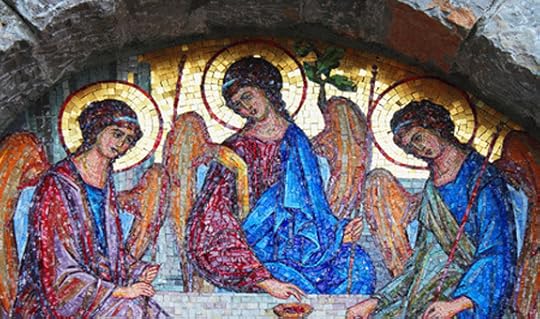
(Photo: © zwiebackesser - Fotolia.com)
A Scriptural Reflection on the Readings for The Solemnity of the Most Holy Trinity | Carl E. Olson
Readings:
• Ex 34:4b-6, 8-9
• Dan 3:52, 53, 54, 55, 56
• 2 Cor 13:11-13
• Jn 3:16-18
The Trinity, the Catechism states, is “the central mystery of Christian faith and life” (CCC 234). There are, I think, a couple of mistakes that can be made when it comes to thinking about this great mystery.
The first is to treat the dogma of the Trinity as a fascinating but abstract concept, a cosmic Rubik’s Cube that challenges us to fit all of the pieces into their place through elaborate, brain-twisting moves. What might begin as a sincere desire to understand better the mystery of one God in three persons can be a dry academic exercise. If we’re not careful, the Trinity can become a sort of theological artifact that is interesting to examine on occasion but which doesn’t affect how we think, speak, and live.
The second mistake is to simply avoid thoughtful consideration of the nature and meaning of the Trinity. The end result of this flawed perspective is similar to the first, minus all of the study: to throw up one’s hands in frustrated impatience, “Well, it doesn’t make any sense. I don’t see what it has to do with me and my life!” While many Christians might not consciously come to that conclusion, the way they think and live suggests that is, unfortunately, their attitude.
In a sermon given in the early 1970s, Father Joseph Ratzinger wrote of how “the Church makes a man a Christian by pronouncing the name of the triune God.” The essential point of being a Christian is to have faith in God. Yet, he wrote, this can be disappointing and incomprehensible if not understood correctly. The primary concern in Christianity, he explained, “is not the Church or man, but God. Christianity is not oriented to our own hopes, fears, and needs, but to God, to his sovereignty and power. The first proposition of the Christian faith and the fundamental orientation of Christian conversion is: ‘God is.’” (The God of Jesus Christ [Ignatius Press, 2008], pp 26-27).
This truth was dramatically revealed to Moses when God spoke from the burning bush and declared, “I AM WHO I AM” (Ex 3:14). In today’s Old Testament reading, from a later passage in Exodus, God further proclaims who and what He is: “a merciful and gracious God, slow to anger and rich in kindness and fidelity.”
But God, of course, is not static or even stoic. In the words of the French poet, Paul Claudel, “we worship a living God who acts, who breathes, who exhales his very Self.” This is beautifully expressed by Saint John the Theologian in today’s Gospel reading. While Moses had been sent by God to reveal the reality and name of God, the Son was sent by the Father to reveal the mystery of God’s inner life, which is perfect love and self-gift (cf., CCC 236, 257). “God so loved the world that he gave his only Son…” Why? That we might have eternal life. And what is eternal life? It is actually sharing in the supernatural life of the Blessed Trinity.
Far from being abstract or of little earthly value, the Trinity is the source of reality and the reason our earthly lives have meaning and purpose. Because God is, we have a reason to be. Because God is love, we are able to truly love. Because God is unity, we are able to be united to Him. Because God is three Persons, we are able to have communion with Him.
St. Gregory of Nazianzus once wrote, “Above all guard for me this great deposit of faith for which I live and fight, which I want to take with me as a companion, and which makes me bear all evils and despise all pleasures: I mean the profession of faith in the Father and the Son and the Holy Spirit.” (CCC 256). May we guard our belief in the Triune God with our lives. And may we better know that the Trinity gives us life. Make no mistake about it!
(This "Opening the Word" column originally appeared in the May 18, 2008, edition of Our Sunday Visitor newspaper.)
June 14, 2014
Discovering the Fatherhood of God in a Gender-Neutral Society

Discovering the Fatherhood of God in a Gender-Neutral Society | Mary Anastasia
In a popular movie of several years ago, a cherubic six-year-old girl blithely explains her family drawing to her dumb struck kindergarten companions: "This is Mark, he's my daytime Daddy; this is Peter, he's my main Daddy; this is Jack, he's my biological Daddy; this is my Mommy, and this is me." This situation, while admittedly contrived for the sake of the comedic story line, still points up a "wrinkle" in modern thinking which sometimes poses problems for the catechesis of children and adolescents. This "wrinkle," or, more properly, this deviation, is the clouding of the concept of fatherhood. This lack of a human "reference point" can make it very difficult to teach young people about the loving Fatherhood of God. This paper will explore the background of the problem, and then look to the Church's teaching for the response of Faith.
The first point to be examined in this review of the problem is one which impacts all the other points. This is the assault on "manliness" in our society today. A very wise man once said, "There is no one so narrow as an open-minded liberal." This statement is illustrated by the rabid way in which the "doctrine" known as "political correctness" is wielded by that small but violently vocal segment of society, the radical feminists. While claiming to champion "equality" between males and females, they have really brought about the emasculation of language and induced a "hunted quarry syndrome" among men today. Those qualities of maleness which once defined the role of the man in the fabric of society have been vilified into grounds for prosecution: the strength which makes him the protector suddenly becomes "animalistic aggression"; the logic and lucidity which give him the ability to provide for his family suddenly become "paternalistic oppression"; the love which moves him to desire children is criticized as "patriarchal enslavement." A generation of men has learned to suppress its instinctive chivalry for fear of fiery retribution. Masculine forms of language have become the dirtiest of swear words and masculinity in men (but not in women) a punishable offense. In short, the essential dignity of being created "male" through the deliberate act of the Creator has been shredded at the altar of misguided "equality."
This emasculated mind-set leads to tangible situations in which the concept of fatherhood is darkened beyond recognition. Webster defines "father" as both a noun and as a verb. As a noun, "father" is listed as "a male parent," while in its verb form it means "to act or serve as a father." In today's society, we very often see the noun function without the verb function: biological fathering is not followed by the continuing presence and nurturing of the male parent.
The root of this phenomenon lies in a defective understanding of sexuality, aptly described by Pope John Paul II in his document, The Gospel of Life:
Sexuality, too, is depersonalized and exploited: from being the sign, place and language of love, that is, of the gift of self and acceptance of another, in all the other's richness as a person, it increasingly becomes the occasion and instrument for self-assertion and the selfish satisfaction of personal desires and instinct. [1]
The prevalence of pre-marital sex and the accepted, if not predestined, ending of so many marriages by divorce, even among Catholics, deprives children today of the manly tenderness and care which only a father can bestow. These children do not have the sense of security provided in a nuclear family headed by a strong yet loving man. Many single mothers labor with supreme love and determined strength to meet both the physical and emotional needs of their children. But the fact remains:
God created man and woman
together
and willed each
for
the other . . . Man and woman were made "for each other"-not that God left them half-made and incomplete: he created them to be a communion of persons, in which each can be "helpmate" to the other, for they are equal as persons . . . and complementary as masculine and feminine. In marriage, God unites them in such a way that, by forming "one flesh," they can transmit human life. [2]
The transmission of human life, and its subsequent nurturing, is intended by the Creator as a "joint project." For children who experience only half of this "communion of persons," the transcending leap to the Fatherhood of God is very difficult, if not impossible.
A second reason which makes the concept of a loving "God the Father" difficult for young people to accept is the plague of domestic abuse in families today. Whether this takes the form of physical violence or mental torture, abuse is a daily event in the lives of increasing numbers of children. Catechists today, attempting to find human analogies for the superhuman love of the heavenly Father, are often faced with stony silence in response. The "terrible secret" behind the blackened eyes and tormented souls quenches any desire for a "Father" in heaven. The Church acknowledges this when she seeks language in which to describe the transcendent love of God:
The language of faith thus draws on the human experience of parents, who are in a way the first representatives of God for man. But this experience also tells us that human parents are fallible and can disfigure the face of fatherhood and motherhood . . . . [3]
A fist constantly raised in anger or a constant "acid rain" of sarcasm can, indeed, "disfigure" the face of fatherhood to the point that the battered child runs from, rather than to, a "Father" in heaven.
A headline screaming from a recent Newsweek magazine summarizes the third issue which impinges on our modern concept of fatherhood. The headline stated, "Twins–With Two Fathers." The story detailed the birth in Holland of twin boys conceived through in vitro fertilization. Only after the twins were several months old did the parents begin to realize that something in the procedure had gone horribly wrong:
It wasn't until two months later that the Stuarts noticed that while one boy was as blond as his parents, the other's skin was darkening and his brown hair was fuzzy. DNA tests confirmed that Wilma had carried another man's baby-probably because a technician reused a pipette that still contained some sperm from a previous insemination. [4]
The dangers of this preponderance of "new techniques" and the twisted thinking of those who utilize them are addressed by Pope John Paul II:
The various techniques of artificial reproduction, which would seem to be at the service of life and which are frequently used with this intention, actually open the door to new threats against life. Apart from the fact that they are morally unacceptable, since they separate procreation from the fully human context of the conjugal act, these techniques have a high rate of failure: not just failure in relation to fertilization but with regard to the subsequent development of the embryo, which is exposed to the risk of death, generally within a very short space of time. [5]
This separation of the conception of children from the conjugal love of parents skews the analogy sought by the "language of faith" quoted earlier in this paper. The question could be raised, "Should we pray to 'Our Father' or 'Our Petri Dish'?"
Finally, a growing trend in today's society obscures even further the picture of human fatherhood. This trend is the legalization in many states of "alternative lifestyles." "Single-sex couples" are being granted many rights and privileges once reserved for what are now labeled "traditional family units." In vitro techniques for conceiving children as well as adoptive placement of children in homosexual households of both genders threatens the integrity of the moral as well as the human development of those children. The push to designate these alternative "units" as "families" completely defies the teaching of Christ, acknowledged in the natural law and codified in the teaching of the Church:
A man and a woman united in marriage, together with their children form a family. This institution is prior to any recognition by public authority, which has an obligation to recognize it. It should be considered the normal reference point by which the different forms of family relationships are to be evaluated. [6]
In no way can "alternative families" be considered in conformity with this "normal reference point." Media coverage of such aberrations contributes to the confusion of many children today over the idea of "father," making correct catechesis all the more necessary.
Thus, the "politically correct" environment and these four infections which flow from it-absent fathers, abusive fathers, "artificial" fathers, and "alternative" fathers-are poisoning the vision of our young people today, making it difficult for them to comprehend the transcendent fatherhood of God. As a beam of intense light can burn out a bodily infection and begin the process of healing, so can the strong rays of Faith's light cleanse these infections of the spirit, revealing to this confused generation of children the face of God the Father. We must turn to Holy Mother Church, as the custodian of the Faith, for this shining antidote.
Since the environment in which our students are immersed very often precludes reference to human fathers as dim examples of the Fatherhood of God, we must bring them to this knowledge by other means. One such method is human reason enlightened by Faith. Focused through the twin lenses of Sacred Tradition and Sacred Scripture, a steady stream of revelation assists natural reason in coming to an understanding of God's Fatherhood. Students today are very literal-minded. They are able to follow the mechanics of reason and to assent to a conclusion reached by that process: the existence of a Creator. After settling side issues, such as, "Where do the Aliens fit into the Creation story?", they are open to continuing the search for the personal identity and the attributes of this Creator. Guided by Faith, this search will collide head-on with the infections contaminating today's perception of manliness.
Shifting from what God shows about himself in his Creation, the search turns to what he tells about himself through his revelation. In answer to the prevailing scorn directed at masculinity, the Church points to her Lord and Master, Jesus Christ, clearly documented in Christian and non-Christian sources as "a man among men." This constant teaching of the Fathers is reaffirmed by Pope Pius XII in his encyclical, Haurietis Aquas:
. . . Nothing, then, was wanting to the human nature which the Word of God united to Himself. Consequently He assumed it in no diminished way, in no different sense in what concerns the spiritual and the corporeal: that is, it was endowed with intellect and will and the other internal and external faculties of perception, and likewise with the desires and all the natural impulses of the senses. [7]
The masculine humanity of Jesus shines forth in every page of the Gospel: in childhood as the only son of the family of Nazareth, he followed his "father," Joseph, in the carpenter's trade; in his public ministry as the wise teacher and gentle healer, he made use of homely examples in his preaching and applied "judicious force" when necessary to get his point across (i.e., the cleansing of the temple); in his passion and death, he strengthened his friends with the everlasting memorial of his Body and Blood and then looked to them for support in his last mortal agony. His injunction to his apostles was carried out by them and passed down to all ages, "What I have done is to give you an example. As I have done, so must you do" (John 13:15). [8]
This man Jesus, the Son of God, is also the most authoritative source for describing God as Father: "Because he 'has seen the Father,' Jesus Christ is the only one who knows him and can reveal him." [9] In the Sacred Scriptures, Jesus repeatedly refers to the "Father who sent me," giving clues in numerous passages as to what this "Father" is like and implying that these qualities of fatherhood are also exercised toward men as adopted sons:
Your Father knows what you need before you ask him. [Matt. 6:8] . . . how much more will your heavenly Father give good things to anyone who asks him. [Matt. 7:11] Be compassionate as your Father is compassionate. [Luke 6:36] Do not live in fear, little flock. It has pleased your Father to give you the kingdom. [Luke 12:32] God so loved the world that he gave his only Son, that whoever believes in him may not die, but may have eternal life. [John 3:16] . . . it is my Father who gives you the real heavenly bread. [John 6:32] [10]
Thus does the search for "fatherhood" reach its culmination. The Catechism of the Catholic Church sums it up in this way:
By calling God "Father," the language of faith indicates two main things: that God is the first origin of everything and transcendent authority; and that he is at the same time goodness and loving care for all his children . . . He also transcends human fatherhood and motherhood, although he is their origin and standard: no one is father as God is Father. [11]
Through the path of reason and Revelation described above, it will be possible to help students today understand God as Father. The greatest aid in this process will be lived example: priests, teachers, and parents who are comfortable in their identity, making no apology for their maleness or femaleness, living in charity with each other and with the society at large, understanding the weaknesses of those who defy God's law yet not condoning the defiance, working to heal the disfigurement of man and restore him to the image and likeness of God. Uniting these qualities with a deep and obvious prayer life will provide a firm foundation on which the next generation may continue to heal the infections of our society, giving their children a true experience of human fatherhood from which they may behold the Fatherhood of God.
[This article originally appeared in the June 1996 issue of Homiletic & Pastoral Review.]
ENDNOTES:
[1] Pope John Paul II, The Gospel of Life, number 23 (St. Paul Books and Media, Boston, 1995), p. 43.
[2] Numbers 371-372, Catechism of the Catholic Church, English Translation, (St. Paul Books and Media, 1994), pp. 94-95.
[3] Ibid., number 239, p. 63.
[4] Elliott, Dorinda and Endt, Frisa, "Twins-With Two Fathers," Newsweek, vol. 126, number 1, July 3, 1995, p. 38.
[5] Pope John Paul II, The Gospel of Life, number 14, (St. Paul Books and Media, Boston, 1995), p. 29.
[6] Number 2202, Catechism of the Catholic Church, English Translation, (St. Paul Books and Media, 1994), p. 532.
[7] Pope Pius XII, Haurietis Aquas, number 40, (Sacred Heart Publication Center, Orlando, 1974), p. 20.
[8] Catholic Biblical Association of America, The New American Bible, (Catholic Book Publishing Co., New York, 1970).
[9] Number 151, Catechism of the Catholic Church, English Translation, (St. Paul Books and Media, 1994), p. 41.
[10] Catholic Biblical Association of America, The New American Bible, (Catholic Book Publishing Co., New York).
[11] Number 239, Catechism of the Catholic Church, English Translation, (St. Paul Books and Media, 1994), p. 63.
"Be a Dad!"

"Be a Dad!" | Fr. Larry Richards | Adapted and excerpted from Be a Man! Becoming the Man God Created You to Be | Ignatius Insight
You are going to die!
It doesn't matter how rich we are, or how popular we are, or how powerful we are: we are all going to "kick the bucket" one day. Isn't that a nice thought?
What we have to do is take some time to sit and meditate about taking our last breath. What do you want your wife to say about you? What do you want your kids to say about you? Once you've decided, "Okay, when I am taking my last breath this is what I want", you can start living your life with your end goal in mind. You will start living in such a way that when the day of your death happens, the people who know you will say what you want them to say.
Death is the ultimate thing that takes control out of our hands. Even if we commit suicide, we cannot control what happens after we die. Not one of us had control over our own birth and not one of us has control of what happens after we die.
I have been to a lot of deathbeds throughout my priesthood, so I know what it is going to be like when you are dying. While you are lying there, the thing that is going to be most important to you is your relationships—the people that you loved and the people that in return loved you.
Then why don't we live every day with that in mind? Make the decision to never let your wife or your kids go to bed or walk out the door without telling them first that you love them—life is just too short! It will change your family. It will change the world.
You should underline John 15:12 in your Bible, where Jesus commands us, "Love one another as I have loved you." This is not an option. He also said, "As the Father has loved me, so have I loved you" (Jn 15:9). Jesus told the people He loved that He loved them.
Why is it that men do not do that? Men are embarrassed. They are afraid. It makes them vulnerable. They think to be a man, you don't go around telling the people you love that you love them; but Jesus told twelve men that He loved them. Then He told us to love others in the same way.
Let me give you a hint: you will never in your life regret that you told your wife and your kids and the people you love that you love them—never. You won't be lying on your deathbed one day saying, "I can't believe that I daily told my loved ones that I loved them. What is the matter with me?"
Now, how do you fall in love with someone? You know that you did not get to know your future wife by meeting her once and giving her forty five minutes to an hour once a week. You spent time with her. You got to know her. The same is true with our relationship with God. It might take you months—it might take you years—but you have to do it. You have to keep spending time with God until the answer to the question of whether or not you know God is unequivocally yes.
We need to know who our true Father is. There's only one Father for everybody: God the Father! That guy you call your dad, he's the instrument of fatherhood, but he's not your true Father.
When we talk about our fathers—whether we had a good father, a bad father, a close and supportive father, or a distant and unsupportive father whom we did not know at all—it doesn't matter as much because the reality is, we all have the same Father in heaven. It's that Father Who will bring healing to us.
Husbands are called to love God primarily through their wives. Your wife is the sacrament of Christ to you. You are the sacrament of Christ to your wife. When she looks at you, she is supposed to see Jesus Christ. That is why Ephesians 5:22–24 is such a wonderful passage. It says, "Wives, be subject to your husbands, as to the Lord. For the husband is the head of the wife as Christ is the head of the Church, his body, and is himself its Savior. As the Church is subject to Christ, so let wives also be subject in everything to their husbands." Many of us remember the translation that said that wives were to be "submissive to their husbands". The problem is that many men just stop with their wives being "submissive". The men love that part, which is why so many women go crazy.
I make this very explicit when I am preaching at a marriage ceremony. I start with the bride and I say, "Sweetheart, you read the Bible every day, don't you?" At first I usually get a "Yes, Father", and then I say kiddingly, "If you lie to a priest, you know, you go to hell." Then she will usually quickly say, "Okay, no, Father." Then I continue, "Well, there is a verse in Ephesians that says, 'Wives, be submissive to your husbands, as to the Lord.' " And then I ask, "Do you think it means what it says?" And I always get an emphatic "No, Father!" Then I literally jump up and down and scream, "Yes, it means what it says!" When I say this, all the feminists in the crowd become very upset and say things like, "This is another reason I hate the Catholic Church." And the bride thinks, "Why did we ever get this priest to marry us?" I love this!
Then, as anyone who knows me knows, I am an equal opportunity offender, so I turn to the groom, who usually likes all of this. Now it is time for the other shoe to fall. I then ask the groom, "You read the Bible every day, right?" He always responds, "No, Father." Then I ask, "Well, do you know what it says in Ephesians after 'Wives, be submissive to your husbands'?" The groom always shakes his head and says, "No." Then I continue, "It says, 'Husbands, love your wives, as Christ loved the Church and gave himself up for her.' " Then I ask, "Do you know what that means?" I then continue kiddingly, "Your life is over!" Then I tell them that every day they need to be more concerned about each other than they are about themselves! That is what marriage is about!
So you need to start to do at least one unselfish act for your wife every day. Surprise her. When was the last time you treated her the same way you did when you were still trying to get her to marry you?
Next, let us focus on your children, which I think is easier because they are a part of you. Do we allow our children to be themselves? Some people think that the best father you can be is a strong disciplinarian. Absolutely, I agree. But just as much as you discipline your children, you must also build them up.
Sometimes we are just harsh and we think this is what God wants, but that isn't the way God is. God loves us. He gives away His life for us. And then He always tells us He loves us. Correct?
One of the roles that men have, given to them by God (see Gen 3:16; 1 Cor 11:3; Eph 5:23), is to be the spiritual leaders of their families. Now this is where I have called men "spiritual wimps" for many years. Many men have let their wives be the spiritual leaders of their families, but this is not the way God created it to be. Now this does not mean that you are the master of your wife and family; it means, like Jesus Christ, you are the servant leader of your family.
First off, this means that you lead by example. You must be a man of prayer. For it is only as a son who listens to his heavenly Father that you can bring the will of the Father to your family. You cannot be a good and true leader unless you are a true and good follower. You must daily spend committed time in prayer with God, then lead your family in prayer. Do you have daily committed time with your family in prayer? And no, grace before meals is not enough!
You need to be the spiritual leader by being a man of sacrifice. You exist to give your life away for others, like Jesus did. That means you give your life for your family first and foremost.
My good friend Danny Abramowicz loves to tell men at men's conferences: "Men, your kids will always love their mother, but they want to become just like you!" If we are not holy ourselves, then our families will not be holy. It is that simple. God is going to speak to men, women, and children, but He is speaking especially to men to help us be His very image.
You are the sacrament of Fatherhood to your children just like St. Joseph was the sacrament of Fatherhood to Jesus. Just as God used St. Joseph to form Jesus Christ in His humanity, so too does He want to use you to form your children. So I would encourage you before you read any further to stop and ask St. Joseph for his intercession for you so you can grow in holiness.
The Lord God of the universe is calling all of us to be great men, men that are examples of Him and who use Him as our example. We are called to become another Christ in this world. Our goal is to bring others to Him.
Do it and you will live forever.
Be a Man! Becoming the Man God Created You to Be | Fr. Larry Richards
• Also available in downloadable e-book format
Men are rediscovering the importance of the spiritual life. And Father Larry Richards is helping them do it. While some writers apply a one-size-fits-all approach to the Christian life, Father Richards draws on his many years of ministry and his own experience as a man to inspire other men as men. 
In Be a Man!, he recounts his struggles to learn true manhood, as well as the inspiring stories of others he has served in his decades as a priest. He tells men how to focus on the right goal, how to live as a beloved son of God, of the need to acknowledge one's faults and to live according to the Holy Spirit, to be a man of true love and of wisdom, to appreciate properly the differences between men and women, to pursue holiness, and to make a difference in the world. Not preachy but direct, Father Richards challenges men to be strong, without putting on a mask of false strength or machismo. He calls men to admit their weaknesses and limitations, while urging them to find strength in faith and genuine love to overcome their sins and faults.
Although a celibate priest, he minces no words when it comes to the place of sexuality--for the unmarried man as well as for the married man. He shows that true manliness is not opposed to love but thrives on it. Father Richards stresses that a relationship with Christ reveals the meaning of a man's life and his identity as a man. He inspires men to become the true heroes they long to be--men of authentic courage, compassion and integrity. This is a highly readable book for men by a man who knows how to talk to men about the things that matter most.
"Father Larry talks straight to men in his own manly style. He pulls no spiritual punches--I don't think he knows how to! He pokes, pushes, sometimes verbally slaps men into being God's men, all with an obvious love for them and faith in their ability to persevere to heaven." -- Dr. Ray Guarendi, radio host and author
"Be a Man is a must-read for all men who are serious about strengthening their relationship with God. This exceptional book speaks clearly and directly, challenging men to live their faith with courage and conviction. Be a Man is a spiritual wake-up call that offers a refreshingly honest presentation of what it means to be a man of God. With a unique blend of humor, passion, and frankness that has become his trademark style, Fr. Larry Richards explores how a Christ-centered male spirituality fosters growth in holiness, and inspires men to become loving servants of their wives, families, and the Church." -- Deacon Harold Burke-Sivers, Aurem Cordis apostolate
Fr. Larry Richards, a popular speaker at men's conferences around the country, is the pastor of an inner city parish in Erie, Pennsylvania. He hosts his own daily national radio show on Relevant Radio, and is the founder of The Reason for Our Hope Foundation.
Carl E. Olson's Blog
- Carl E. Olson's profile
- 20 followers


